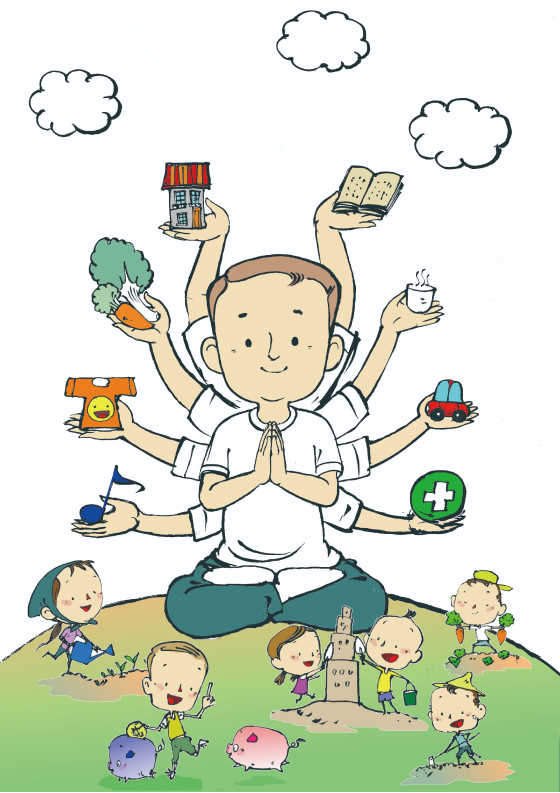Special Topics
Buddhist Perspectives on Wealth
In this world, it is nearly impossible to live without money. However, can wealth guarantee happiness? Amidst the pursuits of high social status and fame, career success, or vast financial wealth, what is true wealth after all?
Is money the root of all evil?
 Money is an essential means for meeting our daily needs. It is a societal norm that people need money to survive. As seen in various Buddhist scriptures such as the Sigālovāda Sutra and the Āgama Sutras, the Buddha not only guided people to make a living by righteous means, but also advised lay people to properly allocate money for living expenses, investments, properties, and savings. That is, the Buddha considered worldly wealth as a resource for individuals to settle down and build their careers.
Money is an essential means for meeting our daily needs. It is a societal norm that people need money to survive. As seen in various Buddhist scriptures such as the Sigālovāda Sutra and the Āgama Sutras, the Buddha not only guided people to make a living by righteous means, but also advised lay people to properly allocate money for living expenses, investments, properties, and savings. That is, the Buddha considered worldly wealth as a resource for individuals to settle down and build their careers.Nonetheless, wealth brings not only food and clothing but also many additional values. It enables a material life of exquisite richness and opulence, allows for the stimulation and enjoyment of sensory pleasures, facilitates a favorable position when building social networks, and serves as a symbol of career success. As wealth accumulates, an illusion gradually develops — the belief that money can procure honor, luxury, fortune, preeminence, confidence, and dignity. This illusion in turn fosters insatiable greed. Once people mistakenly equate inner fulfillment with money, their lives are sucked into a vortex of greed.
Mr. Renshou Syu, who dedicated over three decades to the financial sector, had a deep reflection on this matter. In the early stages of his career, he had a home loan. However, upon seeing the bigger and nicer houses of others, he sold his old house and took out a mortgage for a larger one. One day, during a stroll at a night market, he saw white hamsters at a pet stall, running ceaselessly in a hamster wheel in a cage. This sight made him suddenly realize that if he did not stop his pursuit of material enjoyment, the boundless desire would build an infinitely giant hamster wheel for him, leading him to spend his entire life working for the bank. Foreseeing this outcome, he exercised self-awareness and self-discipline to resist temptations and greed.
A social observer once likened money to a boat used for crossing rivers. Some spend their entire life building larger vessels, but forget to cross the river. Some build their boats and traverse the river, but they still carry the boat on their backs afterward, hindering themselves from moving forward. Only a very few people can truly build a boat, cross rivers, and continue their journey unburdened. When it comes to attitudes toward money, there is much for people to learn.
From worldly wealth to Dharma wealth
What is the relationship between money and people after all? Master Sheng Yen said that karmic rewards are like water, and individuals are the boats on its surface. Rich karmic rewards resemble elevated water levels, allowing the boats to navigate smoothly, while meager karmic rewards leave the water low, making the boats prone to being stranded. Therefore, the Master advocated that we should recognize and cherish what we have, as well as sow and nurture the seeds of blessings for what is yet to come.
commonly known "Giving (tyāga)," the remaining six are:
- Faith (śraddhā), indicating faith in the Buddha, the Dharma, and the Sangha, which engenders one's inner peace and clarity;
- Ethical conduct (śīla) meaning that, in terms of the three karma of deeds, speech, and thoughts, doing no harm to others and self, and staying away from misconduct while engaging in what is supposed to be done;
- Conscience (hrī), which involves a sense of shame when knowing that we could have done better but did not, thereby seeking ways to improve;
- Consideration (apatrāpya) is about reflecting on our unfulfilled responsibilities towards others, and reminding ourselves to care, help, and appreciate other people wholeheartedly;
- Learning (śruta) refers to the capacity to learn the true dharma, and make it a lifelong learning;
- Wisdom (prajñā) is the most precious treasure of merit and virtue. Attaining wisdom can not only free ourselves from vexations but also help others to solve their problems, which is the wealth that benefits both self and others.
Related articles:
Buddhist Perspectives on Wealth
The Financial Quotient of Buddhism
How Can Gold Turn Out to Be a Poisonous Snake?
The Guardian Deities of Wealth Revered in Buddhism
Commonly Asked Questions about the Buddhist Perspective on Wealth
Resource: Issue 394 of Humanity Magazine, Dharma Drum Publishing Corporation
Translation: Sinag-ling Li (李祥苓)
Editing: Keith Brown, Glen
